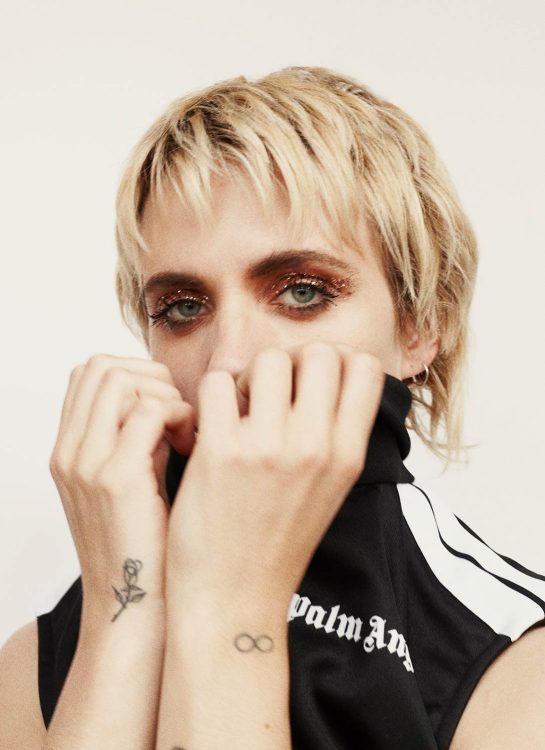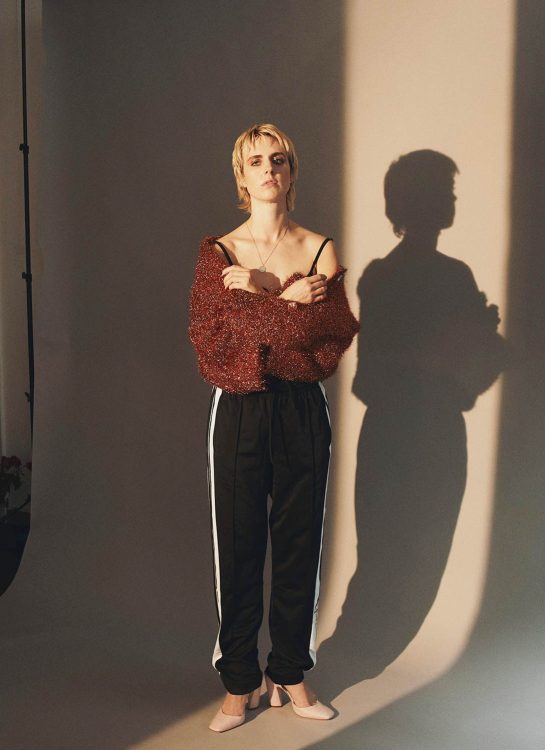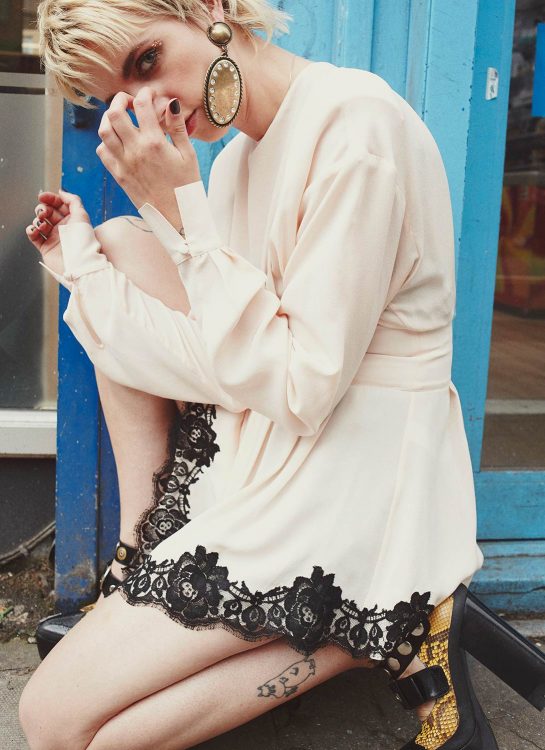- Words Notion Staff
- Photography Clara Nebeling
- Fashion Adele Cany
- Words Pip Williams
- Hair Wilson Fok @ Eighteen Management using Bed Head by Tigi
- Makeup Nancy Sumber @Eighteen Management using Vichy Dermablend
- Photography Assistant Louisa Rechenbach
- Fashion Assistant Shade Huntley
Taken from our Summer 18 issue, read our cover feature with MØ in full for the first time.
In the four years since the release of her debut album No Mythologies To Follow, Danish popstar MØ has become a household name – albeit one nobody in the UK is quite sure how to pronounce. The singer’s arsenal is already impressively crammed with undeniable hits, from her feature on the world-dominating ‘Lean On’ to solo smash ‘Final Song’. With her second record imminent, the Scandinavian artist’s punk past and non-conformist attitude can’t quite quash the apprehension that comes with growing up.
No Mythologies To Follow was an introduction to MØ as an artist with a singular, individual vision. It followed a stellar run of singles released on indie label Chess Club, including the Diplo-produced ‘XXX 88’ and irrepressible pop of ‘Don’t Wanna Dance’. It’s no surprise the follow-up has generated feverish anticipation from across the globe – but that’s not to say we’ve had radio silence in the meantime. MØ’s laundry list of recent collaborators boasts several of the industry’s biggest hitters, from Justin Bieber to Charli XCX.
“I’ve known Charli since 2013,” MØ tells us of her friendship with the British artist. She has featured on both of Charli’s recent mixtapes, lending vocals to Number 1 Angel’s ‘3AM (Pull Up)’ and POP2’s ‘Porsche’. “It was a natural thing, being friends and also collaborators. I love doing things with Charli, she’s so inspiring and so cool! It’s very easy, and very open. I always feel so relaxed – I can be me, I can do my thing.”
MØ and Charli’s collaborative magic was enhanced by the addition of Zara Larsson and Alma to their ranks when the foursome performed as backing singers for Dua Lipa’s Radio 1 Live Lounge performance of monster single ‘IDGAF’.
“I used to be obsessed with the Spice Girls, so obviously I was dying inside,” MØ exclaims of the supergroup experience. “I thought it was so badass and so girl power in the best possible way!”
Not content with teaming up with European pop’s biggest hitters, MØ’s most recent partner in crime hails from across the Atlantic. Carving a name for herself as Miley’s more alternative little sister, Noah Cyrus recruited MØ’s distinctive vocals for a feature slot on “We Are…”, a song the Danish singer praises for its interesting melodies and all-out edge.
“She’s in her zone, you know?” MØ enthuses. “I just loved her energy. She’s so passionate about what she’s doing, and so fun. She asked if I wanted to do a duet with her and I was like, yeah! I want to back this cool young girl.”

- Top Palm Angels

- Top Mulberry
- Trousers Adidas
- Jewellery Artist's Own
- Shoes Jimmy Choo
For MØ, the value of collaboration runs far deeper than mere hit-making. “When I sit as a solo artist and work on my own stuff, I can get a little bit trapped in the concept,” she explains. “It gets very closed. When people invite you to come and do your thing on their thing it liberates you from that. It inspires new energy and new ideas, and makes you really want to push yourself, because you have to live up to their light. I really enjoy being able to breathe, and to make my universe fit with some other artist’s universe. I think that’s such an awesome thing.”
MØ’s universe has a brilliance all of its own: her DIY punk ethos married to globe-conquering commercial success through striking artistic choices. While her current pop trajectory may seem incongruous with her fierce individualism, to MØ herself it makes complete sense.
“Punk is the scene of my youth, but for me punk also means to push the borders, to burn what was old and make something new – destruction and creation. I think it’s possible to bring punk into pop music. It’s hard to do that in very commercial music but some people manage, and those I really worship.
“I think Cardi B is punk as fuck!” she exclaims, before listing off several other artists she sees as currently bringing that unorthodoxy to the mainstream. “Fucking amazing” Tove Styrke makes the list, alongside synth-pop songwriter Empress Of and rapper Princess Nokia. “Talk about being punk,” she says of the latter. “She’s a badass.”
Another badass woman in music who has proved inspirational throughout MØ’s career is Kim Gordon, the frontwoman of her favourite band, Sonic Youth.
“I had never heard a female sing like she sung, so wild and liberated, but also held back and cool and sexy,” MØ gushes. “I was so drawn to her! From the moment I heard her sing I was like, ‘that is how I want to sing. That is the way.’ I wonder if people are able to know how inspired I have been by [Sonic Youth]. I would say that people should listen to them and see if they can find any MØ in there!”
Kim Gordon’s radical vocal style wasn’t all that connected with a young MØ. The frontwoman’s attitude was a catalyst for MØ’s self-discovery and casually post-feminist approach to fame.
“Having role models helps shape you as person and as an artist. [Gordon] was one of the boys, but she also had all her girl friends,” she continues, reminiscing on the personal impact of Gordon’s life and work. “I felt inspired by the way she was – everything about her. I could relate to it. As a teenager, and even now, I’ve never felt like I’m a woman or I’m a man. I’m me, and I’ve always just felt like a person.”
Does MØ see herself as a new role model to fill Gordon’s shoes? She’s modest and almost embarrassed by the idea. “If I give five percent of that to anyone on the planet, I would be fucking happy!”
Sonic Youth were fundamental to the genesis of MØ’s sound, and indeed her career as a musician. To some it may come as a surprised that MØ hasn’t always been MØ. As one half of punk band MOR, she released songs such as the now infamous ‘FISSE I DIT FJÆS’ – in English, ‘PUSSY IN YOUR FACE’. Nevertheless, her wide-ranging influences extended beyond rock and punk, with several mainstream names aiding in the construction of the shimmering pop sound she employs to this day.
“Sometimes I almost forget this, but I was super inspired by No Doubt,” MØ explains. “I don’t know if you’d say they were pop-pop, but they were a big, commercial band.” Others that spring to mind include Destiny’s Child, All Saints, and fellow Danes Aqua, of ‘Barbie Girl’. “I was so into that stuff,” she reminisces, before laughing, “when I became a teenager, it was a total different story.”
MØ’s teenage years are frequently referenced throughout the artist’s current work, even if her younger self would likely have found her sound far too close to the mainstream. This is most explicit in her recent single ‘Nostalgia’, a punchy, radio-friendly track written with Stint, the executive producer of her second record.
“I’ve always been a nostalgic person,” MØ admits, when asked about the catalyst behind the single’s lyrics. “I’m never living in the now. I’m always thinking either about the past, or obsessing and moving towards the future. It came naturally for me to do a song thinking back on the good old days in the suburbs that I grew up in.”
With her thirtieth birthday looming large this summer, it’s understandable that the transition into adulthood is weighing heavily on MØ’s mind. “I can see in my songwriting at the moment that a lot of my songs are about me being scared of growing up; me being scared of becoming an adult,” she continues. “No Mythologies To Follow was about being in your early twenties and being confused about getting older. I’m still on that journey.”
That journey has encompassed more than just music. MØ is everywhere, also familiar as the face of a growing portfolio of fashion big hitters. She’s loath to suggest that a head for fashion is a necessary capability within the music industry, but agrees that it’s been an important part of her own projected persona.
“I’ve always been very interested in fashion. It’s been a natural thing for me, the way I dress. I dress how I feel and how I want people to see me. You dress the way you want to be represented, and it’s the same with music – I want to be personal about it.”
"Blur" by MØ ft. Foster The People
MØ’s look staunchly defies feminine expectations, but her sartorial advice to others is less prescriptive than one might expect from someone with such a defined sense of style. “Dress however the fuck you want, because people want to see who you are,” she directs firmly. “Whatever gets you trippin’, you know?” As for tips, the brands that get her trippin’ are the ones she can see herself heading out in on the daily. “I really relate to brands like Alexander Wang, Astrid Andersen, and even Nike,” she says. That’s why I have loved working with them. I wear that shit!”
As MØ explores these opportunities beyond the music world, a great deal of anticipation continues to build for the follow-up to No Mythologies To Follow. Her global explosion over this period, no doubt aided by her acclaim within both music and fashion spheres, has been a surprising hindrance to her creative process.
Describing the second album as “this thing hanging over my head,” MØ elaborates on how the success of ‘Lean On’ generated a new kind of pressure – “not only from fans and other people, but also from myself” – hence the release of last year’s sparkling EP When I Was Young to plug the gap. Playing on those omnipresent themes of nostalgia, the recent project served to bridge the gap between MØ’s debut and the expectant promise of her sophomore release.
“That EP was me venting, coming with a little summary of some of the songs and some of the thoughts that had been going on all these years,” MØ explains. “It was almost a ritual for me. Right after I had released [When I Was Young] I was like, ‘now I’m ready for the second album! I can finally fucking close that shit.’ It had been such an ahh! The second album! The one and only! The holy grail! I felt like I needed to take it down to earth a little bit. It’s all just music, and it’s just a journey, and it’s fun, and it’s awesome… so here’s some music.”
The release of When I Was Young came shortly before MØ’s shows with Cashmere Cat, a string of joint headline dates sold as the MEØW tour. These shows gave the singer a chance to test the waters with some of her newest material, and gauge the fan reaction to her current direction. Fans across Europe and North America were among the first to hear live versions of the grandiose, almost funereal ‘Roots’, sparsely pulsing ‘Turn My Heart To Stone’, and charmingly unpredictable title track ‘When I Was Young’.
“It’s a little nerve-wracking playing new music,” MØ admits. “It’s super vulnerable, especially when it’s stuff that’s going on your album that’s been five years underway! I love that tension though.”
Across the six tracks of When I Was Young, MØ’s sound veers from glacial left-field to supercharged pop, a breadth she hopes to carry over into the forthcoming full-length.
“There’s a lot of variation on the album. I’ve obviously strived to find a sound that’s cohesive, but there’s a lot of different tempos and vibes,” she outlines, seemingly keen not to go into much further detail. She has lofty dreams for the forthcoming record. Hesitating when asked what she hopes her sophomore effort will bring to those listening, she almost seems worried she’s asking too much.
“I wish it could be possible to change people’s fear of what is different,” she answers, a few seconds later. “Instead of thinking that we want to try and collaborate and help each other, people think that others want to try and fuck them over! Music is a good platform to try to make people be less fearful, to empower people. We live in a time with so many alternative facts; no one really knows what’s right and wrong. It’s easy to create a lot of mass fear. That’s a thing I would love to change, if I could.”

- Dress & Earrings Alessandra Rich
- Shoes Mulberry

- Dress & Earrings Alessandra Rich
- Shoes Mulberry
If she seemed reluctant to divulge her goals for the near future, MØ is even more reticent about the longer term. As a project, MØ is fast approaching its tenth anniversary. Asking where it will be in a further ten years time seems close to triggering an existential crisis.
“Oh my God, shit! Obviously I have big dreams and hopes, all that stuff that I’m secretly dreaming about and wishing for,” MØ giggles, quiet and almost embarrassed. “I’m not very spiritual, but with these things I’m really scared of jinxing anything! I’m so scared that I’ll put it out into the universe and then it’s not going to happen because I was arrogant about it. I’m just going to say that I hope for something great!”
For this fiercely unique yet globe-conquering star, “something great” certainly seems like a reasonable aim.



